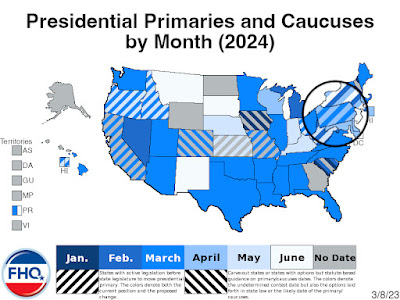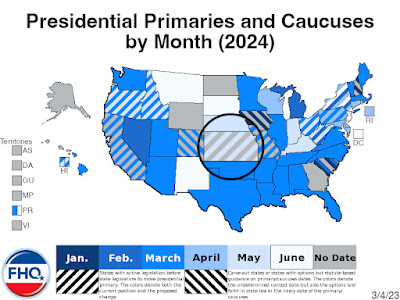Thoughts on the invisible primary and links to the goings on of the moment as 2024 approaches...
It has been a quiet 2023 for presidential primary movement.
And there are a couple of reasons for that. First, counter to some of the thinking with respect to the early calendar maneuvering on the Democratic side,
the change in rules has not resulted in states clamoring to join the fray against national party rules. [
It has led to a different kind of rogue state, perhaps, but it has yet to invite chaos.] Second, there are no heavy hitters involved. There may be bills in delegate-rich states like
California and
New York, but they have shown no signs, at least not to this point, of going anywhere.
But that does not mean that there has not been a typical pre-election year uptick in state-level legislation to reposition primaries for the 2024 cycle. Barely two months into the 2023 legislative sessions in most states, there have been a lot of bills introduced. But the success rate is not there. ...yet. Only
Michigan has moved to this point.
In fact, the number of bills introduced in 2023 thus far is on par with the number proposed in
all of 2007, the year of chaos leading up to
a calendar of contests that saw Florida and Michigan (in)famously go rogue. However, while the bills are there in 2023, none of it really points toward states pushing the boundaries (going before March 1) or crowding around the first Tuesday in March. That was the story of 2007 (although then the operative date was the first Tuesday in February).
Instead, 2023 has offered a mixed bag. States like
Hawaii,
Kansas and
Missouri are attempting to establish state-run primary contests. Legislation in other states, like
Idaho and
Ohio, has proposed moving
back.
Oregon, like Hawaii, is eyeing Super Tuesday and only
West Virginia has proposed breaking the rules to conduct a February primary.
But what is
most likely to affect the success rate of bills proposing presidential primary moves for the 2024 cycle is what will happen in the group of mid-Atlantic and northeastern states with primaries currently scheduled for late April, the contests that conflict with the observance of Passover in 2024. The break up of that regional(-ish) primary that has existed in one form or another since
2012 is a true break up. The three late April states with active legislation to vacate their current positions -- Connecticut,
Maryland and
Pennsylvania -- are targeting three different landing spots, none before March 19.
...
Speaking of Connecticut,
legislation introduced there yesterday would push the presidential primary up to
the first Tuesday in April. Now, of the late April states, only Delaware has not publicly introduced or discussed legislation shifting a presidential primary away from the Passover conflict. Of course, it is probably only a matter of time until the First state follows suit. Importantly, that would likely create
a five week gap from the first Tuesday in April until the first Tuesday in May with no presidential primaries. The calendar is fluid, so there is still some chance that a caucus state or two will fill a weekend slot somewhere in there, but that will leave a lot of time for other things.
As mentioned in this space earlier this week, it was during a similar gap in the 2008 Democratic presidential nomination race into which the Jeremiah Wright story was inserted, taking up a lot of oxygen and putting candidate Obama on the defensive.
And this may not even be the only pronounced gap in the
2024 presidential primary calendar. The Democratic calendar maneuvering will likely push the beginning of the Republican process well into January and create a gap that will cover most of February. Together, those two factors -- Passover and the Democrats' changes -- may create a very disjointed Republican presidential primary calendar in 2024. Early state activity in January and very early February would yield to a gap followed by a flurry of events starting either at the end of February or on Super Tuesday in early March. If March does not resolve the Republican nomination, then the battle will progress into another gap in April and then a resumption of activities in early May.
And FHQ is just spitballing here, but the scenario in which the Republican nomination is unresolved coming out of March, is likely a scenario where everyone will be subjected to incessant stories about a "brokered convention" during that second potential gap in the calendar. And who know what else? Stories of Trump
winning the delegate selection game despite breaking even or losing the delegate allocation game? Some other negative story or series of stories?
States that gamble on a later primary this cycle may reap many of the benefits that do come out of that gap. Candidates will be campaigning there. The bottom line is that the calendar and the sequencing of events on the calendar matters to how the nomination races evolve if not resolve.
...
FHQ is going to try to avoid any quick hits or hot takes about presidential primary polling. That is definitely true at this early juncture and I will keep my word on that regardless with regard to the horserace polling. Others can (and will) cover that territory. But results like the divide among the Republican primary electorate raised in the
recent CNN poll are potentially important. After a midterm cycle in which candidate quality was of concern on the Republican side, a survey pointing toward a primary electorate that values candidates being more proximate to them on issues over electability signals a possible deja vu moment down the line. Maybe that opinion changes in the aggregate as primary season approaches. Maybe it does not. Maybe it all works out and/or Biden's approval is low because of a faltering economy. In the near term, it just signals a defiant Republican primary electorate that is not interested in what "the establishment," however one defines that, has to offer.
...
Trump attacks on DeSantis were/are inevitable, but
this is a unique attack in the half century of the post-reform era. Ethics complaint aside, DeSantis is doing nothing out of the ordinary for a prospective candidate during the invisible primary. It is just that Florida has a resign to run law in place. ...for now.
...
On this date...
...in
1976, it was the day of the Illinois primary. March 16 was also the date on which Jerry Brown announced he was running for the Democratic nomination,
eight weeks after the Iowa caucuses. Clearly, it was a different era. In just the second cycle post-reform, candidates were still entering the nomination race
during primary season. And it was not just during primary season. It was after
nearly 20 percent of the delegates had been allocated. Brown went on to win three contests in May and June and competed to the convention, ceding the nomination there to Jimmy Carter.
...in
1984, Senator John Glenn (D-OH) withdrew from the Democratic nomination race a few days after Super Tuesday.
...in
2004, it was the day of the Illinois primary. There is some primary movement. Or non-movement. Only once during the post-reform era has the Land of Lincoln
not held its presidential primary on the third Tuesday in March. That was in
2008 when an Illinois resident and senator was vying for the Democratic nomination.
--
See more on our political/electoral consulting venture at FHQ Strategies.










